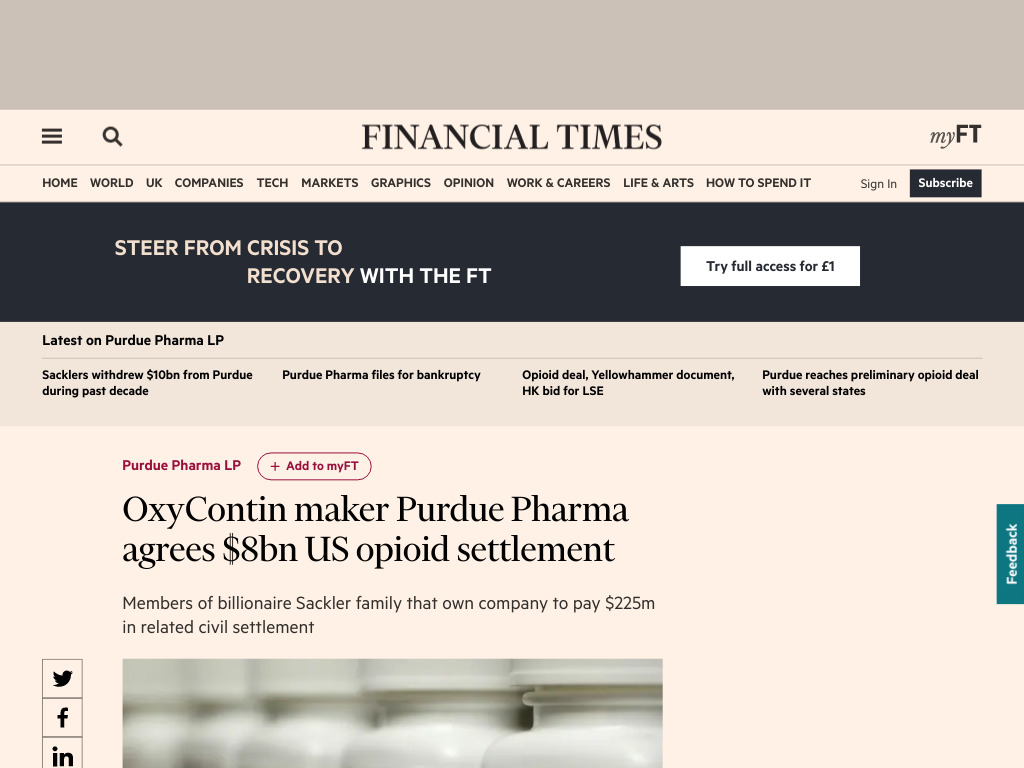Opioid maker Purdue Pharma has agreed to a criminal and civil settlement with the US justice department worth more than $8.3bn in connection with its role in fuelling the US opioid epidemic.
The maker of OxyContin, a powerful prescription opioid, will plead guilty to three felony counts, including two counts of violating federal anti-kickback laws, and conspiracy to defraud the US, prosecutors announced on Wednesday.
In the plea agreement, the company admitted it “knowingly and intentionally conspired and agreed with others to aid and abet” doctors dispensing medication “without a legitimate medical purpose”.
In a related settlement, members of the billionaire Sackler family that own Purdue agreed to pay $225m. The civil settlement did not release any Purdue executives or employees from any future criminal liability.
Rachel Honig, the first assistant US attorney in New Jersey, confirmed an investigation of individuals was continuing but did not say which individuals. Purdue has agreed to pay a $3.5bn criminal penalty, $2.8bn in civil damages and $2bn in criminal forfeiture. But the total is unlikely to be collected as the company went bankrupt last year. The federal government is expected to allow the states and counties suing Purdue to cover costs related to the epidemic to take priority in the creditors’ queue, according to a person familiar with the matter.
If the court approves, the Sackler family will give up control of Purdue, which will be turned into a public benefit corporation when it emerges from bankruptcy, focused on making drugs to tackle the opioid crisis — treating addiction and reversing overdoses — and donating or offering them at a steep discount.
Announcing the settlement, Jeffrey Rosen, deputy attorney-general, said: “The abuse and diversion of prescription opioids has contributed to a national tragedy of addiction and deaths, in addition to those caused by illicit street opioids.”
The settlement “reaffirms that the Department of Justice will not relent in its multipronged efforts to combat the opioids crisis,” he added.
The US opioid epidemic was fuelled by soaring prescriptions for the powerful drugs, before many people moved on to illegal opioids. In 2018, 128 people died of opioid overdoses each day, and the Centers for Disease Control and Prevention estimates that the economic burden of the crisis costs $78.5bn a year.
The deal will not end litigation for Purdue Pharma or the members of the Sackler family, which face lawsuits from states and counties across the US. Many states are pushing back on their offer to settle the suits for between $10bn to $12bn, which would include $4bn of in-kind payments including treatments for opioid overdoses, and $3bn from the family, some of which it would try ti raise by selling its European business Mundipharma.
In 2007, Purdue paid more than $600m and three current and former executives pled guilty to criminal charges that they misled doctors, patients and regulators about how dangerous the drug was.
Steve Miller, Purdue’s chairman who joined in July 2018, said the resolution was an “essential step in our bankruptcy process”. “Purdue deeply regrets and accepts responsibility for the misconduct detailed by the Department of Justice in the agreed statement of facts,” he said.
Members of the Sackler family who served on the Purdue board said in a statement: “This proposed resolution includes relinquishing our ownership of Purdue and has been valued at $10-$12 billion — more than double all Purdue profits the Sackler family retained since the introduction of OxyContin.
“We have deep compassion for people who suffer from opioid addiction and abuse and hope the proposal will be implemented as swiftly as possible to help address their critical needs.”
Andrew Kolodny, co-director of Opioid Policy Research at the Heller School for Social Policy and Management, said that the closer he looked at the deal, “the more it smells”.
“If you want to prevent corporate executives and board members from taking action that can lead to a massive loss of life, the individuals who take those actions must be held individually accountable. All the pain that the Sackler's feel of this is $225m, which is nothing,” he said.
The deal comes in a busy week for the US Department of Justice ahead of the US election. On Tuesday, the attorney-general sued Google for violating antitrust laws, while a settlement with Goldman Sachs, over its involvement in the 1MDB money laundering and bribery scandal, is expected later this week.
Interesting how a few hundred thousand cases of manslaughter only results in a fine. Throw these fuckers in jail and lose the key.


